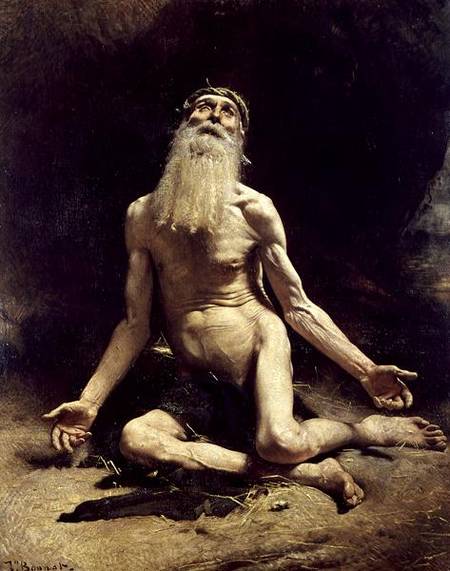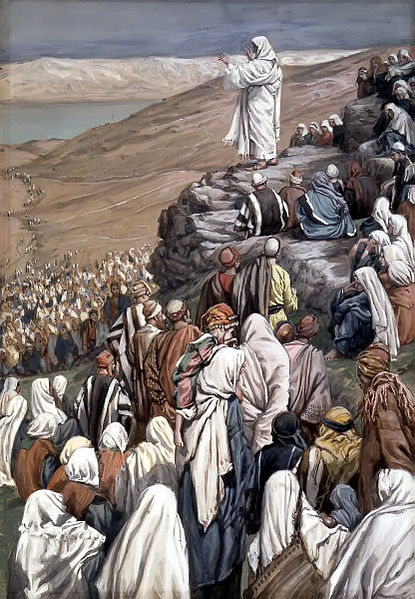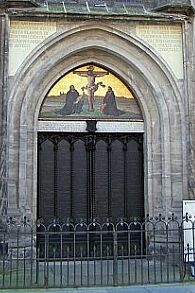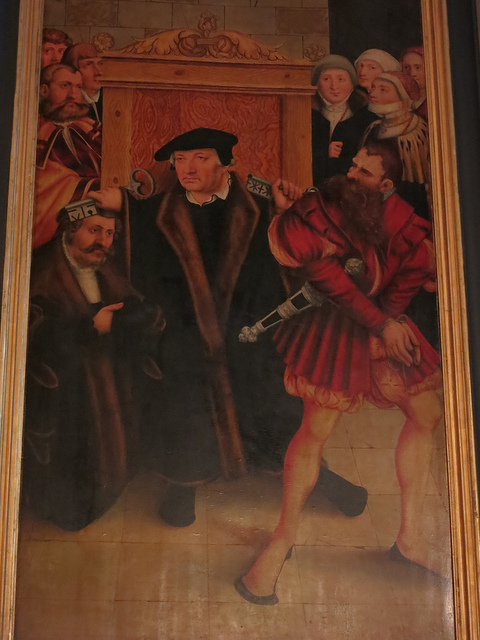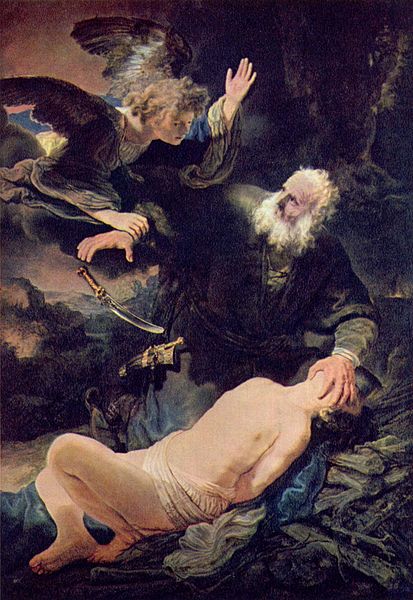Jeremiah 15
Anger and Regret
Then the LORD said to me: Though Moses and Samuel stood before me, yet my heart would not turn towards this people. Send them out of my sight, and let them go! 2And when they say to you, ‘Where shall we go?’ you shall say to them: Thus says the LORD:
Those destined for pestilence, to pestilence,
and those destined for the sword, to the sword;
those destined for famine, to famine,
and those destined for captivity, to captivity.
3And I will appoint over them four kinds of destroyers, says the LORD: the sword to kill, the dogs to drag away, and the birds of the air and the wild animals of the earth to devour and destroy. 4I will make them a horror to all the kingdoms of the earth because of what King Manasseh son of Hezekiah of Judah did in Jerusalem.
5 Who will have pity on you, O Jerusalem,
or who will bemoan you?
Who will turn aside
to ask about your welfare?
6 You have rejected me, says the LORD,
you are going backwards;
so I have stretched out my hand against you and destroyed you—
I am weary of relenting.
7 I have winnowed them with a winnowing-fork
in the gates of the land;
I have bereaved them, I have destroyed my people;
they did not turn from their ways.
8 Their widows became more numerous
than the sand of the seas;
I have brought against the mothers of youths
a destroyer at noonday;
I have made anguish and terror
fall upon her suddenly.
9 She who bore seven has languished;
she has swooned away;
her sun went down while it was yet day;
she has been shamed and disgraced.
And the rest of them I will give to the sword
before their enemies,
says the LORD.
Jeremiah can be a very harsh book since it comes at the point of the story between God and God’s people where there is no easy way to fix the brokenness, it is a story where something will have to die for the possibility of new life. The leadership of Judah have become attracted to the Assyrian culture which seemed so powerful here at the beginning of Jeremiah’s ministry (the fact that it refers to what King Manasseh did points to an early date since Jeremiah begins his ministry in the time of Josiah, Manasseh’s successor). Even here at the beginning God seems to be at the point of being out of patience, of not wanting to hear from the prophet- and yet perhaps through the prophets intercession God will seemingly grant more time or at least allow the political situation to develop. Yet, God seems to swing from unrelenting anger in the first four verses to a tone of regret in 5-9 where at the beginning we see the anger for what the nation became and then in 5-9 the regret over the brokenness of the relationship. I’ve mentioned before that the God portrayed in Jeremiah has very human emotions and has been deeply wounded by the brokenness of the relationship with God’s people and is finally at the point where God can no longer abide with them in the same place. The old covenant which God has held to and yet the people have not, where God has tried to give the blessing and apparently held back the woes of the Deuteronomic covenant, this covenant is finally beyond reconciliation in the way that it is. For new life and a new covenant something has to die so that something new can live.
God is weary, worn, tired and heartbroken. Wrath and anger in Jeremiah are not signs of a cruel and vicious God, but rather a God who was so deeply involved with the people that God was wounded and heartbroken. As harsh as the language of Jeremiah is, and indeed as offensive as it may at points be, it is the language of relationship. For all the violence and destruction of the language you can never say that the God that Jeremiah points to doesn’t care.
Taking God to Task
10 Woe is me, my mother, that you ever bore me, a man of strife and contention to the whole land! I have not lent, nor have I borrowed, yet all of them curse me. 11The LORD said: Surely I have intervened in your life for good, surely I have imposed enemies on you in a time of trouble and in a time of distress. 12Can iron and bronze break iron from the north?
13 Your wealth and your treasures I will give as plunder, without price, for all your sins, throughout all your territory. 14I will make you serve your enemies in a land that you do not know, for in my anger a fire is kindled that shall burn for ever.
15 O LORD, you know;
remember me and visit me,
and bring down retribution for me on my persecutors.
In your forbearance do not take me away;
know that on your account I suffer insult.
16 Your words were found, and I ate them,
and your words became to me a joy
and the delight of my heart;
for I am called by your name,
O LORD, God of hosts.
17 I did not sit in the company of merrymakers,
nor did I rejoice;
under the weight of your hand I sat alone,
for you had filled me with indignation.
18 Why is my pain unceasing,
my wound incurable,
refusing to be healed?
Truly, you are to me like a deceitful brook,
like waters that fail.
19 Therefore, thus says the LORD:
If you turn back, I will take you back,
and you shall stand before me.
If you utter what is precious, and not what is worthless,
you shall serve as my mouth.
It is they who will turn to you,
not you who will turn to them.
20 And I will make you to this people
a fortified wall of bronze;
they will fight against you,
but they shall not prevail over you,
for I am with you
to save you and deliver you,
says the LORD.
21 I will deliver you out of the hand of the wicked,
and redeem you from the grasp of the ruthless.
Jeremiah has been given a rough calling, to proclaim a message that nobody wants to hear and to be considered politically traitorous and religiously dangerous. Jeremiah’s words have not made him any friends and many enemies, and here we see Jeremiah tormented by the calling God gave him. I think most leaders who have faced opposition can relate to these words, maybe not quite to the level of Jeremiah, but there are times where we lament our calling and the pain and loneliness it can bring. To wonder if it would be easier to never have existed or if somehow our life were to end. I don’t know if Jeremiah ever contemplated suicide, but he certainly despaired of his life getting better. He lived in a rough time to be a prophet, and these words are especially surprising if they do come early in his ministry in the time of Josiah, a time that most voices in the bible considered a time of great revival and return to God’s ways. Yet, Jeremiah seems to be the one called on in the midst of all the trumpets of celebration to play the dirge. He is off key with everyone else of his time and because of that he is an outsider and is persecuted. Yet God’s words to the prophet are not encouraging, instead they are letting Jeremiah know it is going to get worse. There is no easy balm here, there is no springs of renewal, only the long journey into the wilderness of desolation. Jeremiah turns to the tradition of laments, like in the Psalter where the psalms of lament call upon God, the lift up the reality that God knows what is going on and they call on God to act. Unlike most the Psalms of lament though God does not answer in the expected way. The prophet goes so far as to accuse God of being unreliable, of in effect saying, “God you deceived me, you lied to me, I have done everything you have asked and you have allowed everyone else to prosper while I remain with a wound that won’t heal. Jeremiah gives us an incredibly rich, if sometimes combative set of language to be in conversation with God about, and yet, God’s answer is harsh as well. It is almost as if Jeremiah screams at God from his wounds and God yells back. “If you turn back…if you utter what is precious…” and in a world where there is a woundedness that will not heal, where preachers and prophets and people run into persecution for attempting to be faithful to the calling God has for them. Perhaps there is the freedom to vocally wrestle with God, to scream at God in frustration and to know that we may not always like God’s answers. Yet in the midst of all of this God promises God’s presence “I am with you…I will make you… I will deliver you.” In the midst of the darkness and depression, in the midst of the times when God’s faithful want to scream that they feel betrayed, in the midst of all the pain and confusion, perhaps the gospel is the presence of God that does not abandon in precisely those moments. In those moments where we may not want God around that God does not abandon and journeys with us through the darkest days.

